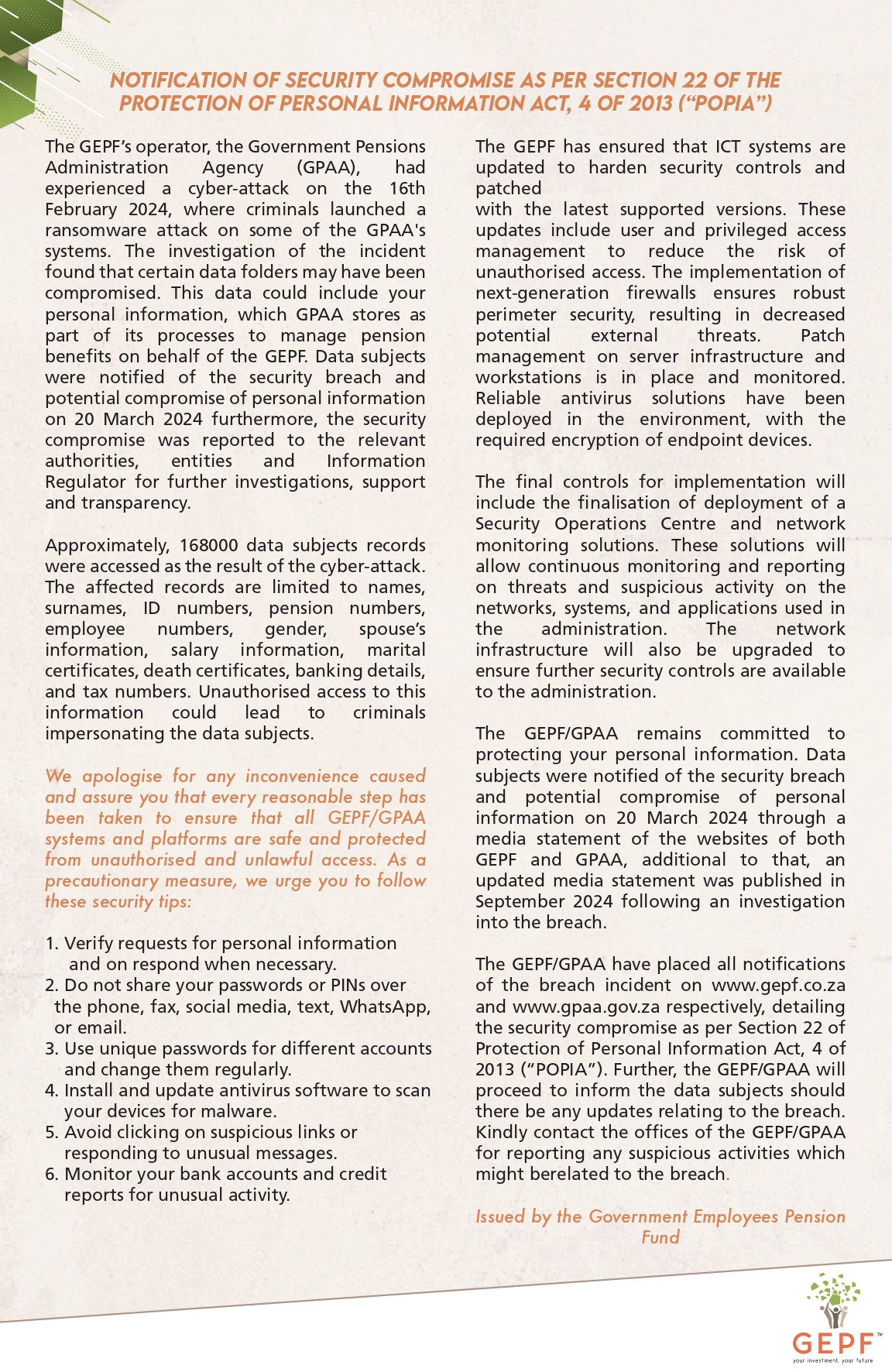MEDIA RELEASE
26 October 2022, Pretoria
The GEPF will from 1 November 2022 implement its revised actuarial factors. This follows the 31 March 2021 statutory actuarial valuation report of the Fund. The actuarial interest factors are updated in line with any changes to the assumptions used at each statutory actuarial valuation of the Fund. The current actuarial interest factors are based on the 31 March 2018 statutory valuation, which was implemented with effect from 1 July 2019 to date.
The implementation of the revised factors follows the completion of a consultation process with labour organisations as required by the Government Employees Pension Law, 1996. The GEPF is required to consult with public sector labour unions concerning the calculation of actuarial interest factors which are determined when the Fund undertakes a statutory valuation.
Actuarial interest factors are used to determine the actuarial interest benefits which represent the value of a member’s benefit in the Fund, as outlined in the GEPF Rules.
Payment of a member’s actuarial interest occurs on resignations or other exits from the Fund where members have less than 10 years of pensionable service. The factors are mainly driven by how future salaries and pensions are expected to increase as well as the level of returns that the Fund’s investments are expected to earn in the long term. These drivers are referred to as economic assumptions.
The economic assumptions are based on market conditions as at the valuation date. The gap between the returns that the Funds’ investments are expected to earn in the long term (discount rate) and the salary/pension increase assumptions is what affects the factors the most. The higher this gap is, the lower the actuarial factors will be.
The gap between the returns that the Fund’s investments are expected to make in the long term and the rate at which salaries and pensions are expected to grow in the long term was higher in the 2021 statutory actuarial valuation than in the previous valuation of 2018. The revised factors result in actuarial interest values that are on average 14% lower than those that would result from the 2018 factors. The extent to which individual members’ actuarial interest factors will differ between the 2018 and 2021 factors depends on their age and category (i.e., whether they are Service members or not).
A common misconception from members is that a reduction in actuarial factors is a reduction in the guarantees promised to them by the Fund. This however is not correct. The actuarial interest factors do not change the benefit promised by the Fund upon retirement. The Fund guarantees the pension benefits payable in retirement. The value today of these future pension benefits cannot be guaranteed as this depends on the economic conditions and expectations at each point in time. Actuarial factors reflect the value of these guaranteed future pensions in today’s terms. These factors, therefore, change when market expectations about the future are adjusted at each valuation date.
Failure of the Fund to implement the revised factors would result in exiting members being paid more than their fair share of the Fund’s assets thereby disadvantaging members who remain in the fund and ultimately those that retire with the Fund.
The changes to the actuarial factors will affect all resignations and other exits where members have less than ten years of pensionable service from 1 November 2022.
In summary, the 2021 actuarial factors have reduced from the 2018 factors. The factors are lower due to the changing economic assumptions adopted for the 2021 statutory actuarial valuation. As a result, changing the assumptions ensures the GEPF’s assets and liabilities are matched and that members get paid their fair share of benefits and no one is disadvantaged.
Issued by Government Employees Pension Fund
For more information please contact: Matau Molapo, Communications
T: +27 (0) 12 424 7315
M: +27 (0)79 1910 757
E: Matau.molapo@gepf.co.za


